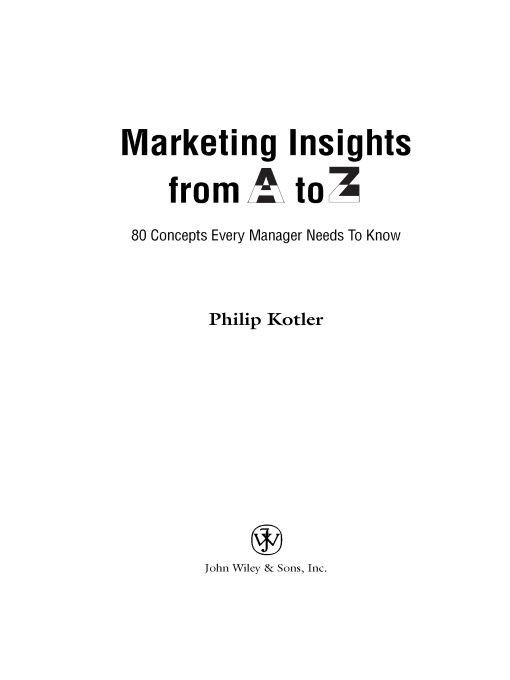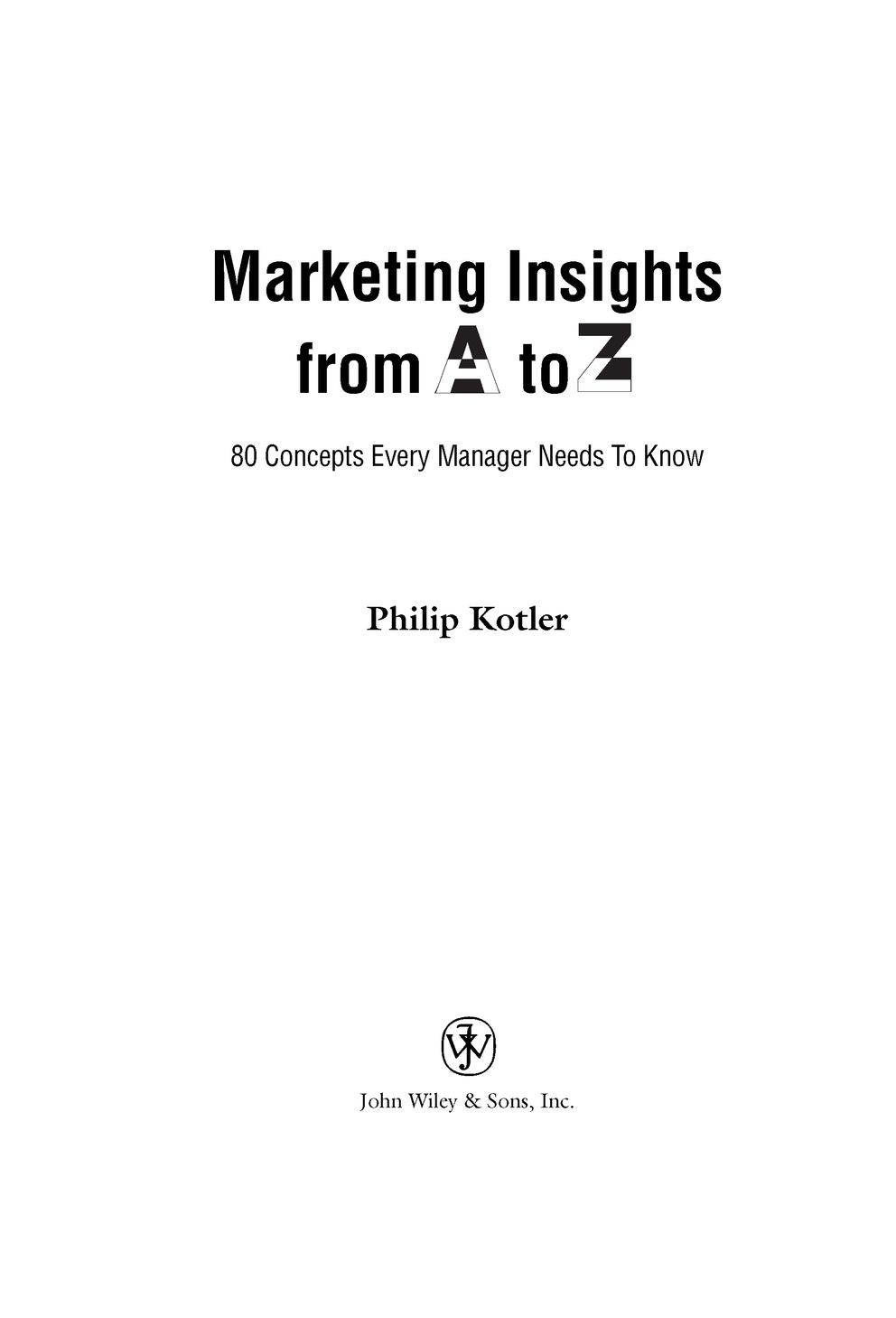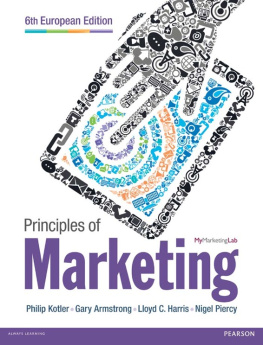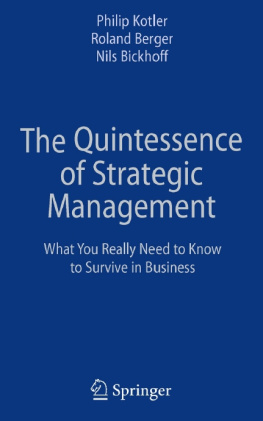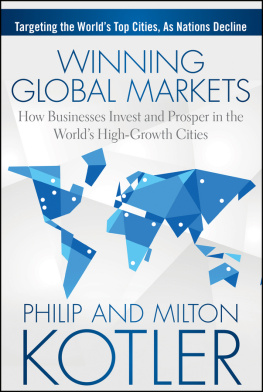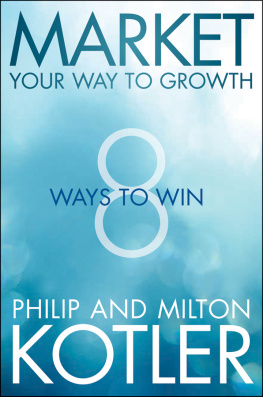Table of Contents
Praise forMarketing Insights from A to Z
The bagwan of Marketing strikes again. Leave it to Phil Kotler to revisit all of our blocking and tackling at just the right time... and as all great marketers know: timing is everything.
Watts Wacker
Founder and CEO, FirstMatter
Author, The Deviant Advantage: How Fringe
Ideas Create Mass Markets
Wide-ranging, readable, pithy, and right on target, these insights not only are a great refresher for marketing managers but should be required reading for all nonmarketing executives.
Christopher Lovelock
Adjunct Professor, Yale School of Management
Author, Services Marketing
Kotler tackles the formidable challenge of explaining the entire world of marketing in a single book, and, remarkably, pulls it off. This book is a chance for you to rummage through the marketing toolbox, with Kotler looking over your shoulder telling you how to use each tool. Useful for both pros and those just starting out.
Sam Hill
Author, Sixty Trends in Sixty Minutes
This storehouse of marketing wisdom is an effective antidote for those who have lost sight of the basics, and a valuable road map for those seeking a marketing mind-set.
George Day
Geoffrey T. Boisi Professor of Marketing,
Wharton School of Business
Here is anything and everything you need to know about where marketing stands today and where its going tomorrow. You can plunge into this tour de force at any point from A to Z and always come up with remarkable insights and guidance. Whatever your position in the business world, there is invaluable wisdom on every page.
Stan Rapp
Coauthor, MaxiMarketing and
Max-e-Marketing in the Net Future
A nourishing buffet of marketing wisdom. This is a book to which you will return many times after the initial reading.
Leonard Berry
Distinguished Professor of Marketing,
Texas A&M University
Author, Discovering the Soul of Service
To all those who have worked in business and marketing with a passion to satisfy customer needs and enhance customer and societal well-being.
Preface
My 40-year career in marketing has produced some knowledge and even a little wisdom. Reflecting on the state of the discipline, it occurred to me that it is time to revisit the basic concepts of marketing.
First, I listed the 80 concepts in marketing critical today and spent time mulling over their meanings and implications for sound business practice. My primary aim was to ascertain the best principles and practices for effective and innovative marketing. I found this journey to be filled with many surprises, yielding new insights and perspectives.
I didnt want to write another 800-page textbook on marketing. And I didnt want to repeat thoughts and passages that I have written in previous books. I wanted to present fresh and stimulating ideas and perspectives in a format that could be picked up, sampled, digested, and put down anytime. This short book is the result, and it was written with the following audiences in mind:
Managers who have just learned that they need to know something about marketing; you could be a financial vice president, an executive director of a not-for-profit organization, or an entrepreneur about to launch a new product. You may not even have time to read Marketing for Dummies with its 300 pages. Instead you want to understand some key concepts and marketing principles presented by an authoritative voice, in a convenient way.
Managers who may have taken a course on marketing some years ago and have realized things have changed. You may want to refresh your understanding of marketings essential concepts and need to know the latest thinking about highperformance marketing.
Professional marketers who might feel unanchored in the daily chaos of marketing events and want to regain some clarity and recharge their understanding by reading this book.
My approach is influenced by Zen. Zen emphasizes learning by means of meditation and direct, intuitive insights. The thoughts in this book are a result of my meditations on these fundamental marketing concepts and principles.
Whether I call these meditations, ruminations, or cogitations, I make no claim that all the thoughts in this book_ are my own. Some great thinkers in business and marketing are directly quoted, or they directly influenced the thoughts here. I have absorbed their ideas through reading, conversations, teaching, and consulting.
Introduction
Todays central problem facing business is not a shortage of goods but a shortage of customers. Most of the worlds industries can produce far more goods than the worlds consumers can buy. Overcapacity results from individual competitors projecting a greater market share growth than is possible. If each company projects a 10 percent growth in its sales and the total market is growing by only 3 percent, the result is excess capacity.
This in turn leads to hypercompetition. Competitors, desperate to attract customers, lower their prices and add giveaways. These strategies ultimately mean lower margins, lower profits, some failing companies, and more mergers and acquisitions.
Marketing is the answer to how to compete on bases other than price. Because of overcapacity, marketing has become more important than ever. Marketing is the companys customer manufacturing department.
But marketing is still a terribly misunderstood subject in business circles and in the publics mind. Companies think that marketing exists to help manufacturing get rid of the companys products. The truth is the reverse, that manufacturing exists to support marketing. A company can always outsource its manufacturing. What makes a company prosper is its marketing ideas and offerings. Manufacturing, purchasing, research and development (R&D), finance, and other company functions exist to support the companys work in the customer marketplace.
Marketing is too often confused with selling. Marketing and selling are almost opposites. Hard-sell marketing is a contradiction. Long ago I said: Marketing is not the art of finding clever ways to dispose of what you make. Marketing is the art of creating genuine customer value. It is the art of helping your customers become better off. The marketers watchwords are quality, service, and value.
Selling starts only when you have a product. Marketing starts before a product exists. Marketing is the homework your company does to figure out what people need and what your company should offer. Marketing determines how to launch, price, distribute, and promote your product/service offerings to the marketplace. Marketing then monitors the results and improves the offering over time. Marketing also decides if and when to end an offering.
All said, marketing is not a short-term selling effort but a long-term investment effort. When marketing is done well, it occurs before the company makes any product or enters any market; and it continues long after the sale.
Lester Wunderman, of direct marketing fame, contrasted selling to marketing in the following way: The chant of the Industrial Revolution was that of the manufacturer who said, This is what I make, wont you please buy it? The call of the Information Age is the consumer asking, This is what I want, wont you please make it?

